Ampere’s Law and Its Applications
Important Questions on Ampere’s Law and Its Applications
Assertion : A direct uniformly distributed current flows through a solid long metallic cylinder along its length. It produces magnetic field only outside the cylinder.
Reason : A thin long cylindrical tube carrying uniformly distributed current along its length produces a magnetic field inside it. Moreover, a solid cylinder can be supposed to be made up of many thin cylindrical tubes.
A coaxial cable is made up of two conductors. The inner conductor is solid and is of radius the outer conductor is hollow of inner radius and outer radius The space between the conductors is filled with air. The inner and outer conductors are carrying currents of equal magnitudes and in opposite directions. Then the variation of magnetic field with distance from the axis is best plotted as
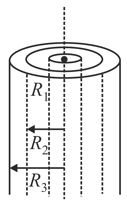
A current flows along the length of an infinitely long, straight, thin walled pipe. Then
In a coaxial, straight cable, the central conductor and the outer conductor carry equal currents in opposite directions. The magnetic field is non-zero
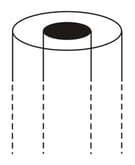
An electric current is flowing in a circular coil of radius . At what distant from the centre on the axis of the coil will the magnetic field be of its value at the centre.
A long straight wire of radius carries a steady current . The current is uniformly distributed across its cross-section. The ratio of the magnetic field at and is
A current flows along the length of an infinitely long, straight, thin-walled pipe. Then,
A long straight wire of radius carries a steady current . The current is uniformly distributed over its cross-section. The ratio of the magnetic fields $B$ and $B^{\prime}$ at radial distances $\frac{a}{2}$ and respectively, from the axis of the wire is
An infinitely long hollow conducting cylinder with inner radius and outer radius R carries a uniform current density along is length. The magnitude of the magnetic field, as a function of the radial distance r from the axis is best represented by :
An infinitely long straight non-magnetic conducting wire of radius a carries a dc current . The magnetic field , at a distance from axis of the wire is
A constant direct current of uniform density is flowing in an infinitely long cylindrical conductor. The conductor contains an infinitely long cylindrical cavity whose axis is parallel to that of the conductor and is at a distance from it. What will be the magnetic induction at a point inside the cavity at a distance from the centre of cavity?
Axis of a solid cylinder of infinite length and radius lies along the axis. It carries a uniformly distributed current along direction. Magnetic field at a point is
A coaxial cable is made up of two conductors. The inner conductor is solid and is of radius & the outer conductor is hollow of inner radius and outer radius . The space between the conductors is filled with air. The inner and outer conductors are carrying currents of equal magnitudes and in opposite directions. Then the variation of magnetic field with distance from the axis is best plotted as
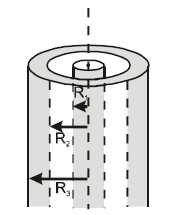
In a coaxial straight cable, the central conductor and the outer conductor carry equal currents in opposite directions. The magnetic field is zero
A long, thick straight conductor of radius carries current uniformly distributed in its cross section area. The ratio of energy density of the magnetic field at distance from surface inside the conductor and outside the conductor is :
Figure shows an amperian path . Part is in vertical plane while part is in horizontal plane . Direction of circumlation along the path is shown by an arrow near point and at for this path according to Ampere’s law will be :
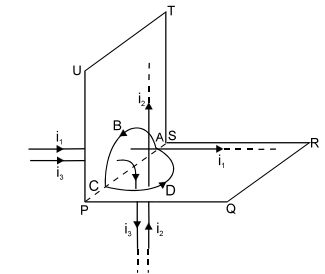
Rank the value of for the closed paths shown in figure from the smallest to the largest.
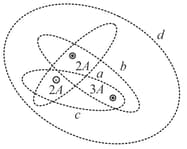
The current density inside a long solid cylindrical wire of radius is in the direction of the central axis and its magnitude varies linearly with radial distance from the axis according to where, . Find the magnitude of the magnetic field at in .

